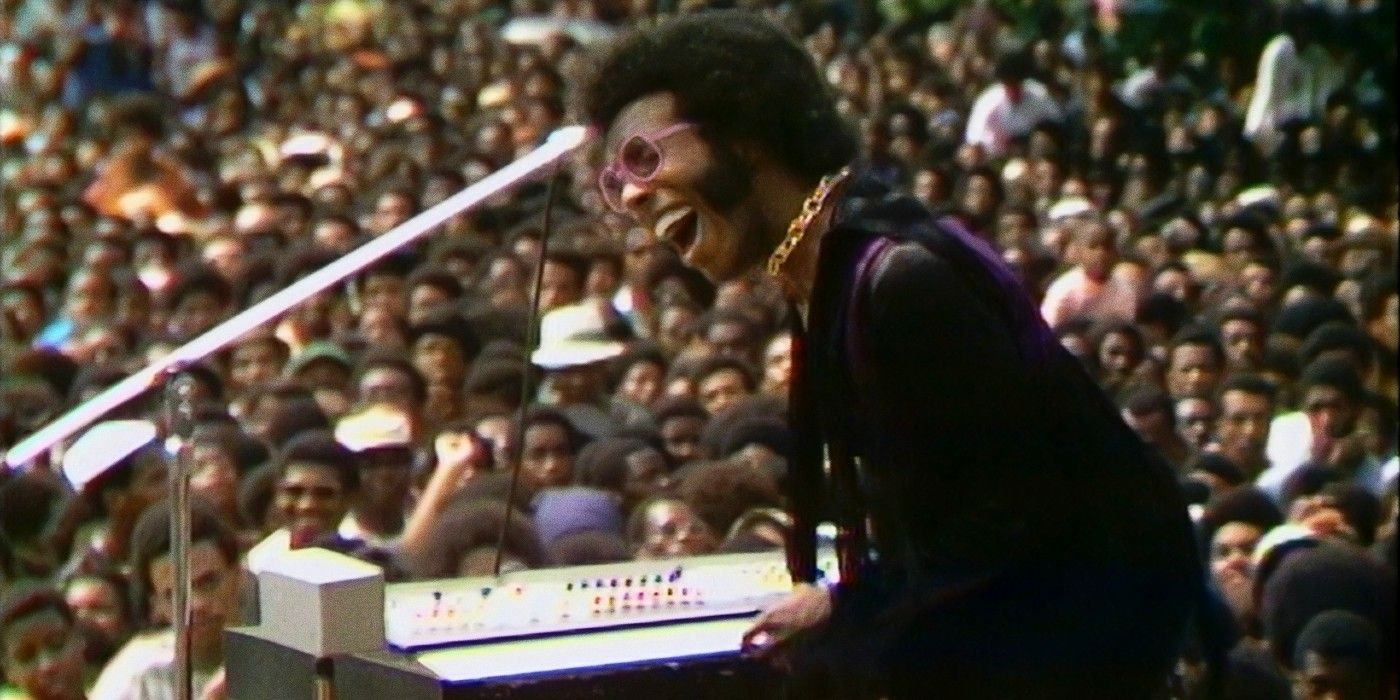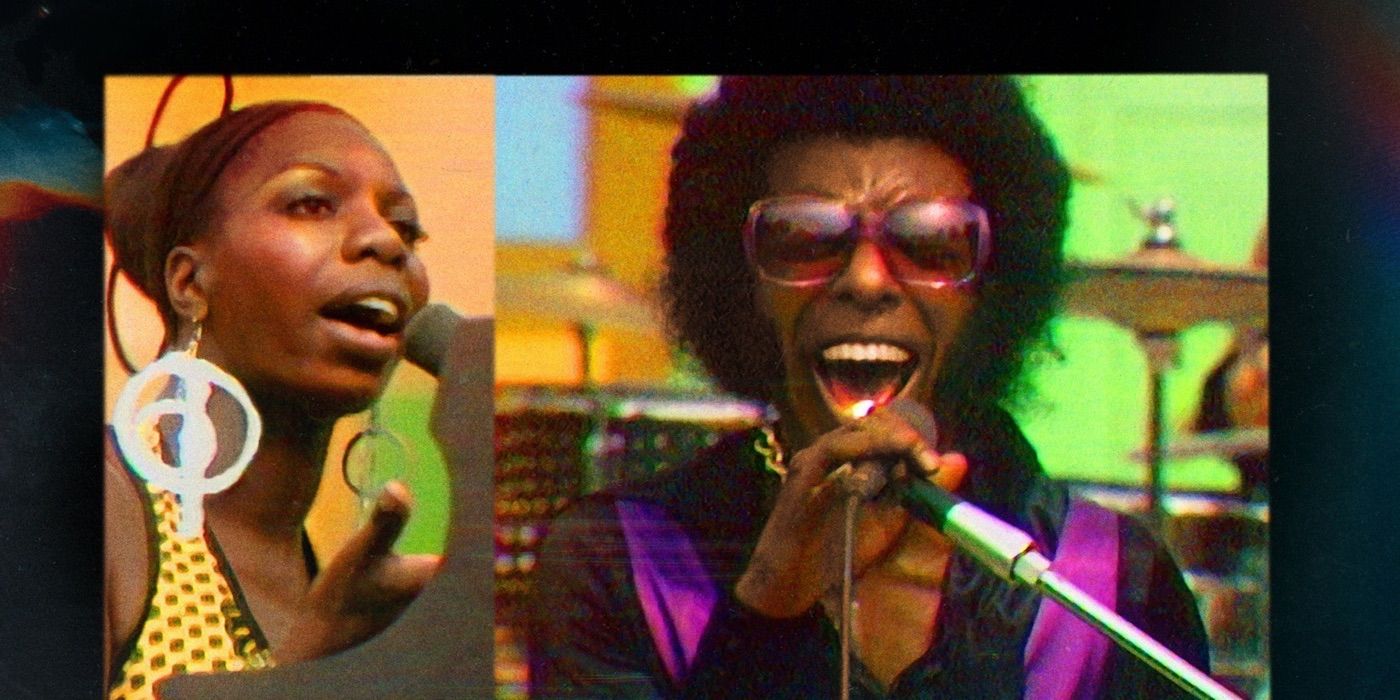The summer of 1969 has long been remembered for the Woodstock music festival, three days that became a defining event for the decade. But only a hundred miles away in Harlem, over 300,000 people gathered over the course of six Sundays for the Harlem Cultural Festival. Attendees could see legends like Stevie Wonder, Nina Simone, B.B. King, and Gladys Knight & the Pips. While Woodstock would be revered and remembered for decades to come, the footage of the Harlem Cultural Festival, later known as “Black Woodstock,” would be kept in a basement for half a century. Yet Ahmir “Questlove” Thompson rectifies that with his debut documentary Summer of Soul (…Or, When the Revolution Could Not Be Televised), a tremendous look at the forgotten celebration, the changing culture of the time, and the power of simply being remembered.
Questlove is the perfect voice to tell this story, and one would never realize this is his first film based on his work here. Questlove is best known as the drummer for The Roots and as the musical director for Late Night with Jimmy Fallon, but he also has an encyclopedic knowledge of all things music, and has worked with artists such as D’Angelo, Solange, and Al Green. Questlove’s adoration and passion for these artists and this music is clear from the very beginning of the film. The director opens Summer of Soul by showing one of the attendees footage from the concert. The man’s eyes light up, as if he is experiencing the energy and pure beauty of this experience again for the first time, and it's easy to see Questlove having the exact same reaction to this incredible find.
There’s a musicality to the way that Questlove directs Summer of Soul. This feels like a documentary crafted by an expert musician who knows exactly how to present these legends. When summarizing the events of the 1960s and of the concert early on, Questlove edits to the beat, playing these clips with the precision that he brings to the drums. With every beat, the excitement grows, and the weight of this festival only grows.
Questlove doesn’t just use Summer of Soul as a way to remind viewers of this event they probably haven’t heard of, he’s also using it to inform the audience of the significance and greatness of these artists. During a performance of “Aquarius/Let the Sunshine In” by The 5th Dimension, he shows surviving members of the band this footage for the first time. They explain how important the concert was for them, especially playing to Black audiences, when many thought that they were an all-white band. When presenting footage of Mahalia Jackson performing with The Staple Singers, Mavis Staples discusses how getting to sing with such a legend was a career-high for her. Questlove is giving context not just to why this music is important, but why it was integral to these artists as well.
Amongst all this, Questlove takes time to let the audience enjoy the incredible performances that have been unearthed. One of the concerts occurred when Neil Armstrong landed on the moon, and many attendees say that seeing these bands is more important to them than that event. Seeing these artists live in this film, it’s easy to understand why.
With this festival, Questlove is also showing the changing styles of music at the end of the 60s, as well as the changing of society in general. After an electric show by Wonder, Questlove takes the time to show how this was a critical point in Wonder’s career, how he would soon go on to move into socially conscious songwriting, and some of the most important albums of his career and the 1970s. One can easily see the changing scope of music and the lifestyles at the concert. One attendee says that he and his friends dressed in suits like they were in The Temptations, yet after seeing Sly and the Family Stone perform in Harlem, their style completely changed. The times they were a-changing, and Questlove is able to show that naturally by just presenting the staggering and diverse lineup for this event.
Summer of Soul would be a remarkable documentary if Questlove was doing little more than revealing this incredible lineup that rivals Woodstock. Instead, in addition to showing the shifting of culture in the world overall, he’s also showing the history of Harlem, the cathartic power of music that connects communities and different people, and just how important it is for Black stories to not be forgotten. Considering this concert featured some of the most iconic and important artists of the 1960s, it is truly shocking that this footage has never been shown before, and that this festival isn’t more widely known.
2021 has already been an impressive year for music documentaries from established filmmakers like Dan Lindsay and T.J. Martin’s Tina Turner documentary, Tina; R.J. Cutler’s Billie Eilish: The World’s A Little Blurry; and Edgar Wright also making his debut documentary, The Sparks Brothers. With his debut film, Questlove makes the best music documentary of the year so far, a film that isn’t satisfied with just focusing on the artists themselves, but digs into the history and communities that were built around the music at the center of this story. With Summer of Soul, Questlove has created a joyous and loving story of the music he adores, and the importance of not forgetting the voices that made the world what it is today.
RATING: A-
Summer of Soul is now streaming on Hulu and is playing in select theaters.


